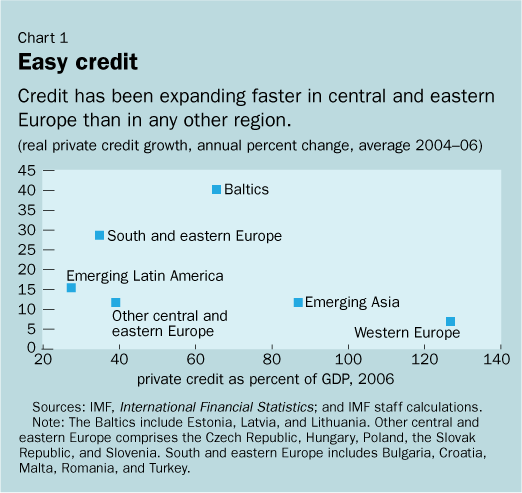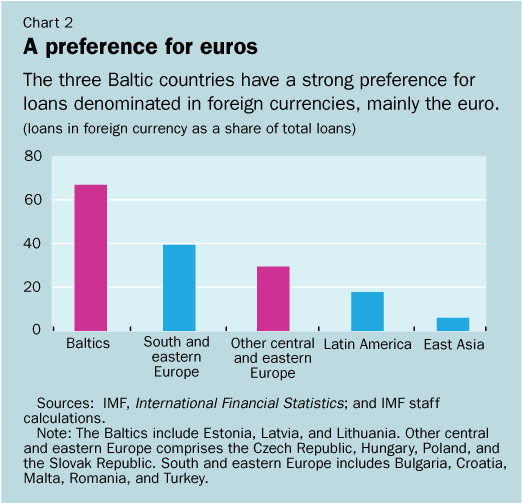
Typical street scene in Santa Ana, El Salvador. (Photo: iStock)
IMF Survey: Banking Risks Rise in Eastern Europe
September 25, 2007
- Rapid credit growth has helped channel domestic, foreign savings
- Brisk expansion of credit raising concerns about prudential risks
- Quantifying risks is challenge: region not yet through full credit cycle
Credit to the private sector has expanded at a fast clip in central and eastern Europe during the past decade, outpacing most other regions of the world.

Shopping mall in Ploesti, Romania: eastern Europe has pent-up demand after decades of socialist economics (photo: Uwe Gerig/DPA)
FINANCIAL SECTOR SURVEILLANCE
Rapid credit growth (see Chart 1) reflects a number of factors:
• low levels of financial development and pent-up demand pressures following decades of socialist economic management;
• good macroeconomic discipline and membership in the European Union (EU), which lowered country risk premiums; and
• improved access to foreign capital following the entry of foreign banks and the opening of capital accounts.
Assessing the risks
Rapid credit growth has brought important benefits, helping channel domestic and foreign savings to households and investors and supporting financial sector development and economic growth in the region. But the brisk expansion of credit is raising concerns about macroeconomic and prudential risks (that is to say, whether banks remain sound).

Quantifying these risks is a challenge because countries in central and eastern Europe have not gone through a full credit cycle yet, and financial soundness indicators tend to improve in the upward phase of the credit cycle.
Key points
The issue: Credit growth in central and eastern Europe is supporting financial deepening and economic growth in the region, but the brisk expansion in credit is raising concerns about the quality of some bank portfolios.
Bottom line: So far, rapid credit growth does not appear to have weakened banks in central and eastern Europe, but there is a risk that this might change in the future, given that credit is increasingly being intermediated through weaker banks, especially in some countries.
Policy implication: Bank supervision should be forward looking and risk based, and the regulatory policy response should be calibrated to address the underlying risks and preexisting distortions.
But experience in industrial and emerging market countries suggests that credit booms can be associated with unsustainable domestic demand booms, overheating, and asset price bubbles. Financial sector difficulties also cannot be ruled out—for example, loan losses may occur during a deep recession or following a large exchange rate depreciation if loans are denominated in foreign currency.
How significant these risks are in central and eastern Europe and what role public policy should play in containing them are key questions facing policymakers.
Banking risks on the rise
On the surface, rapid credit growth in central and eastern Europe does not appear to have weakened banks. (It remains to be seen how the current turmoil in financial markets will affect banks in the region, but so far there have been no signs of a major fallout.) However, the reason financial soundness indicators are not yet pointing to a deterioration in credit quality could be that they are based on systemwide statistics rather than reflecting assessments of data from individual banks and there is a lag before bank data become publicly available.
Our analysis suggests that the granting of credit is becoming increasingly divorced from bank soundness—all banks, including weak ones, seem to be expanding at an equally rapid pace. This suggests that prudential risks are on the rise.
Our findings underscore the importance of forward-looking and risk-based supervision to keep the risks associated with rapid credit growth at manageable levels while maximizing the benefits of credit for financial development and economic growth.
In particular, supervisors need to give more attention to weaker banks that are growing rapidly. This would also be consistent with the risk-based approach to supervision that central and eastern European countries are moving to as they implement the new capital adequacy accord, known as Basel II.
Increased prudential risks are most apparent in the fastest-growing credit markets. These markets include lending to households, foreign currency-denominated or indexed lending, and lending in the three Baltic countries, where weaker banks are expanding at a faster rate than sounder banks (see Chart 2). A stronger policy response is thus warranted in each of these markets. Such a response may involve, for example, higher capital requirements and tighter loan classification and provisioning rules, differentiated on a bank-by-bank basis.

Getting the policy response right
When designing a prudential policy response to rapid credit growth, policymakers need to be mindful of the fact that an overly intrusive response may penalize rapidly expanding banks that are managing risks properly, thereby potentially hindering financial and economic development. Excessive policy intervention also runs the risk of encouraging banks to transfer business to the nonbank sector or offshore, complicating the task of assessing and supervising such risks.
These considerations suggest that priority needs to be given to risk-based supervision as a way of containing the risks associated with rapid credit growth. Supporting policy measures should aim at removing underlying distortions, for example, generous subsidies and tax incentives for real estate borrowing in some countries.
Foreign banks taking on more risk
Rapidly expanding foreign-owned banks, which have a prominent presence in central and eastern Europe, seem to be taking on more financial risks than domestically owned banks, although the strength of their parent banks tends to compensate for the greater risk taking.
But will foreign parents always be willing to support their subsidiaries in times of need? The internationalization of banking in central and eastern Europe underscores the need for close cross-border cooperation between home and host country supervisors in the region. Besides regular exchanges of supervisory information, which are reportedly already taking place, such cross-border cooperation could also include joint inspections and crisis management exercises.
This article is based on IMF Country Report No. 06/414, "Czech Republic, Republic of Estonia, Hungary, Republic of Latvia, Republic of Lithuania, Republic of Poland, Slovak Republic, and Republic of Slovenia—Export Structure and Credit Growth,"


